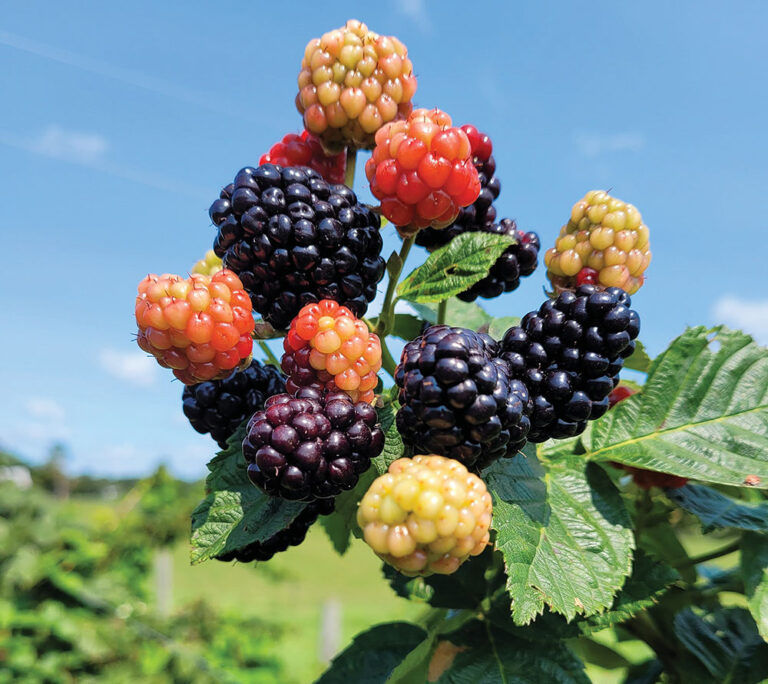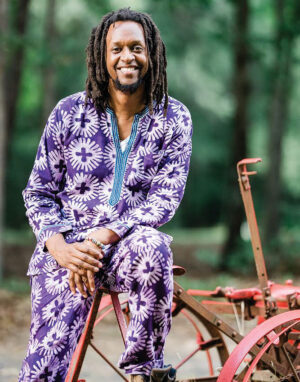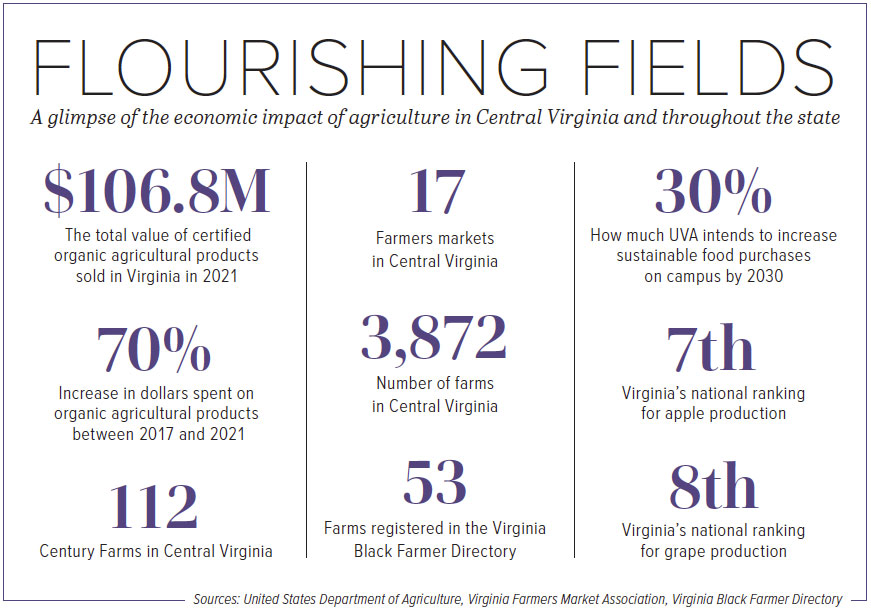Central Virginia Farmers Cultivate Sustainability
Agriculture in Virginia thrives behind diverse farmers who act as stewards of the earth.

Central Virginia farmers are finding ways to grow a unique range of crops while implementing sustainable practices. As the state’s largest private industry, agriculture in Virginia continues to thrive thanks to its geography and the diverse farmers who act as stewards of the earth.
Meeting the Demand for African Crops
At Carter Farms in Unionville, Michael Carter Jr. tends to land that has been in his family since 1910. A fifth-generation farmer, Carter has continued his family’s entrepreneurial legacy by focusing his efforts on growing specialty African crops. Organic produce such as okra, sweet potatoes, Scotch bonnet peppers, taro leaves and African nightshade, or mnavu, are grown using sustainable no-till methods.

Michael Carter Jr.
As the Washington, D.C., area is home to the third-largest African immigrant population in the U.S., Carter has found a niche in a rising demand for African crops.
“When I was in West Africa, I wanted food that was familiar to me,” Carter says. “Here, African immigrants want Scotch bonnet peppers or some taro leaf.”
Through his other business, Africulture, Carter shares his knowledge with aspiring farmers through workshops and seminars. “I grow farmers, as I like to say,” Carter says. “I don’t just grow food and produce in sustainable ways, but really grow the occupation of agriculture with Black farmers.”
After researching his own ancestry, Carter realized the importance of honoring his family’s legacy in his work and began to share that with others.
“I started encouraging other farmers to grow and share more of their history and utilize their stories as part of their crop profile,” Carter says.

Starting from Scratch
Justin Griffin of Gifted Greenery is a former U.S. Postal Service employee who embraced small-scale farming during the pandemic in 2020. Having started out with a 94-square-foot balcony space in a Baltimore apartment, Griffin now operates a small farm in the region, catering to the Charlottesville area.
“People support me there,” Griffin says. “I feel at home in Charlottesville.”
Entirely self-taught, Griffin credits online videos with getting him started on this path. Griffin’s produce, from tomatoes and kale to watermelon and cucumbers, is all pesticide-free. He frequently utilizes worm castings and alfalfa meal as fertilizer, embracing these more sustainable methods of farming.
“If I’m out in the field, I’ll pick the beans and eat them,” Griffin says, “Anything I grow, I’ll eat it right out of the field.”
Griffin’s story underscores the importance of farmers markets in supporting local producers. He sells his products at the Farmers Market at Ix, an art park in Charlottesville. “Farmers markets provide access to small farmers like myself,” Griffin says.

Best Practices for Central Virginia Farmers
At Cattle Run Farm in Ruckersville, Sarah Morton and family carry on an agricultural legacy that goes back three generations. “I’ve been involved in the agrarian industry since the age of 7,” Morton says.
Cattle Run Farm produces grass-fed beef, pasture-raised pork, free-range chickens, blackberries and vegetables. Morton recognizes the importance of implementing sustainable practices as agriculture continues to dominate the Virginia economy.

Sarah Morton
In hopes of educating aspiring farmers on best practices, Morton founded the Minority and Veteran Farmers of the Piedmont with her brother, Ralph, a military veteran. A cooperative consisting of local farmers, the organization is an educational resource tool for small farmers.
“It’s really critical for people to see the value of Virginia’s agriculture industry,” Morton says. “Not only are we contributing to our own source of food, we’re contributing to other nations’ sources of food.”
However, the sourcing and maintenance of productive land remain essential to the survival of this industry and the people who participate in it.
“We have to understand the value of land and how that land is going to contribute to the mental health, the nutritional health, and the emotional and physical health of individuals across the nation and the globe,” Morton says.
Get to Know Central Virginia
Want to learn more about living and working in Charlottesville, VA, and the surrounding communities? Check out the latest edition of Livability Central Virginia.
